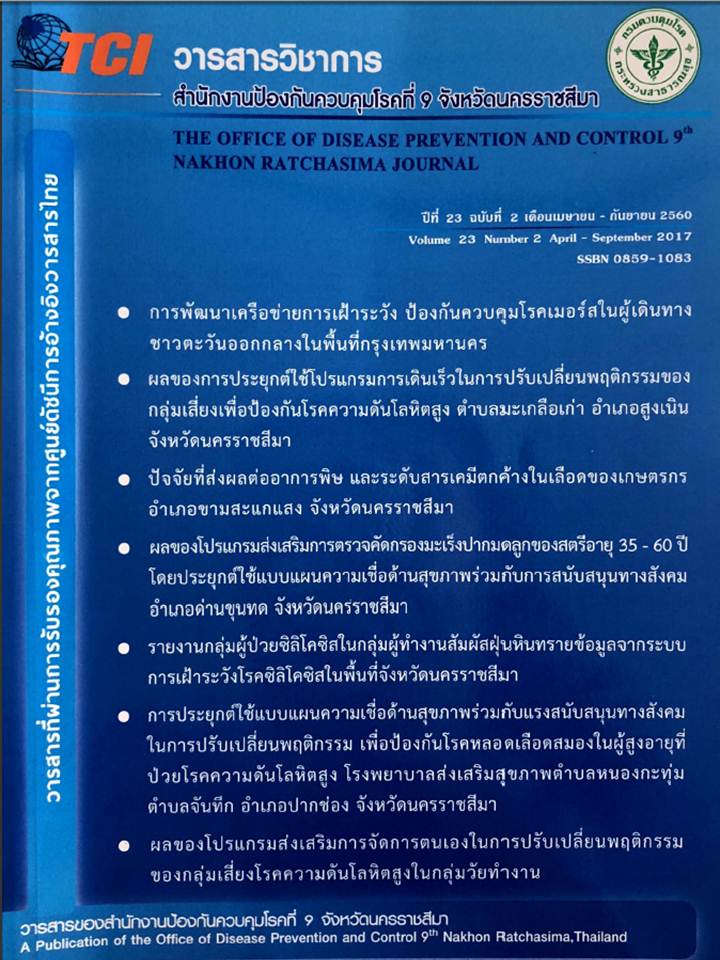Effects of self-management promotion programs on the behavioral modi cation of risk groups high blood pressure in working age group
Keywords:
risk group, hypertension, self management, behavioral change programAbstract
This study was a quasi-experimental research at studying the effects of self-management
promotion programs on the behavioral modi cation of hypertension risk groups. Working class By studying
the risk of high blood pressure. Working age group aged 35 - 59 years and screened by Nong Pling
Health Promotion Hospital NakhonRatchasima. Sample selection by voluntary participation in the
program. It is required to work in a factory in Suranaree Industrial Zone. A total of 100 participants
were enrolled for a six-month period from July to December 2016. The experimental group was 50
and the control group was 50. The instrument used in this study was a questionnaire. Data analysis
by statistics, percentage, mean, standard deviation And compare mean scores using paired t-test
and independent t-test.
The results showed that after participating in the self-management promotion program to change
health behaviors, the experimental group had an average score on knowledge of high blood
pressure, stroke having meal exercise, stress relief was higher than control group and signi cantly
different at 0.05 level. The experimental group had mean scores on eating behavior, exercise stress,
relaxation smoking and alcohol consumption were higher than control group and the difference
was statistically significant at the 0.05 level. The experimental group had better health status.
Body mass index, blood pressure, Systolic blood pressure, Diastolic blood pressure were better
than control group and were statistically different at 0.05 level. Thus, 3 Self Health Behavior
Modi cation with a focused PROMISE Model focused on service recipients. Teaching to take notes.
There is a set of health goals that aspire to happen to oneself, having the capacity to self-be capable.
Have con dence in decisions about their health status. Leads to the power of self-management.
Modify eating behavior, exercise, Stop smoking and Home visits. Kitchen visit And have knowledge
support Counseling and exchange of experience. Make risk groups more knowledge able and have
better self-management competencies. As a result, risk groups can manage themselves to reduce
their risk behaviors and reduce their own chronic diseases effectively.
References
Region 6 Medical J.2009; 23:141-51.
2. Titeemat H. Self health care of hypertensive patients. Thai Journal of Nursing Research. 2005;
5: 269-280. Thai.
3. กรมควบคุมโรค. คู่มือการจัดบริการสุขภาพกลุ่มวัยทำงานแบบบูรณาการ. สำนักโรคไม่ติดต่อ, กรุงเทพฯ ; 2558.
4. กรมควบคุมโรค. รายงานสถานการณ์ NCDS ฉบับที่ 2 Kick off to the Goals. สำนักพัฒนานโยบายสุขภาพ
ระหว่างประเทศ, กรุงเทพฯ ; 2559.
5. กรมควบคุมโรค. หลักสูตรการปรับเปลี่ยนพฤติกรรมสุขภาพสำหรับพยาบาลผู้จัดการรายกรณีโรคเรื้อรัง.
สำนักโรคไม่ติดต่อ, กรุงเทพฯ; 2559.
6. กุลพิมล เจริญดีและนิตยา พันธุเวทย์. นโยบายในการส่งเสริมสุขภาพและการป้องกันโรคในกลุ่มงาน
ไม่ติดต่อ.[ออนไลน์]. 2557 [เข้าถึงเมื่อ 2557 พฤษภาคม 15]. เข้าถึงได้จาก http://portal.in.th/
les/2/4/2/2009/11/06/DMday2009. pdf.
7. กรมควบคุมโรค. รายงานสถานการณ์โรคไม่ติดต่อเรื้อรัง เขตสุขภาพที่ 9 ปี พ.ศ. 2553-2558. สำนักงาน
ป้องกันควบคุมโรคที่ 9 นครราชสีมา, นครราชสีมา ; 2558.
8. กรมควบคุมโรค. รายงานผลการตรวจราชการสาธารณสุขเขตสุขภาพที่ 9 ปี 2559. สำนักงานป้องกัน
ควบคุมโรคที่ 9 นครราชสีมา, นครราชสีมา ; 2559.
9. ชดช้อย วัฒนะ. การสนับสนุนการจัดการตนเอง : กลยุทธ์ในการส่งเสริมการควบคุมโรค. วารสารวิทยาลัย
พยาบาลพระปกเกล้าจันทบุรี 2558 ; 26 : ฉบับเพิ่มเติม 1 กันยายน 2558 :118-127.
10. อังศินันท์ อินทรกำแหง. การพัฒนาพฤติกรรมสุขภาพ : 3 self ด้วยหลัก PROMISe Model. กรุงเทพฯ:
สุขุมวิทการพิมพ์, 2552.
11. ประหยัด ช่อไม้ และอารยา ปรานประวิตร. ผลของโปรแกรมสร้างเสริมสุขภาพในการปรับเปลี่ยนพฤติกรรม
สุขภาพของกลุ่มเสี่ยงโรคความดันโลหิตสูงในโรงพยาบาลส่งเสริมสุขภาพตำบลบ้านเขาดิน อำเภอ
เขาพนม จังหวัดกระบี่. วารสารบัณฑิตวิทยาลัยพิชญทรรศน์ 2558 ; 10(1) : 15-24.
12. ยุพา ฟูชื่น และวิไลพรรณ วัชรธาดาพงศ์. ประสิทธิผลของโปรแกรมปรับเปลี่ยนพฤติกรรมสุขภาพของ
ประชาชนกลุ่มเสี่ยงต่อโรคหลอดเลือดสมองในเขตโรงพยาบาลส่งเสริมสุขภาพตำบลบ้านเอื้อม อำเภอ
เมือง จังหวัดลำปาง. [ออนไลน์] [เข้าถึงเมื่อ 2559 ตุลาคม 12]. เข้าถึงได้จาก http://gishealth.
moph.go.th./healthmap/ upload/document/work_06129_191016_232105.pdf.
13. สุพิชชา วงค์จันทร์, อังศินันท์ อินทรกำแหงและพรรณี บุญประกอบ. ผลโปรแกรมการปรับเปลี่ยน
พฤติกรรมสุขภาพ 3-Self เพื่อลดภาวะอ้วนของวัยรุ่นตอนปลาย. วารสารพฤติกรรมศาสตร์ 2557;
20(1):127-141.

Published
How to Cite
Issue
Section
License
Articles published in the Journal of the Office of Disease Prevention and Control 9 Nakhon Ratchasima are the copyrighted property of the Office of Disease Prevention and Control 9 Nakhon Ratchasima.



